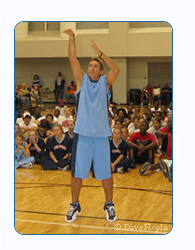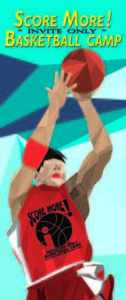 Today I had the pleasure of hearing Dave Hopla, Basketball Shooting Expert, speak at the Pure Shot Basketball Camp in Jaffrey, NH. Special thanks to Dave & Nancy Springfield who run the camp and arranged the event. The event was also sponsored by Dennis Wright and if anyone has more background on the sponsor, please be sure to add it as a comment so we can all thank him as well.
Today I had the pleasure of hearing Dave Hopla, Basketball Shooting Expert, speak at the Pure Shot Basketball Camp in Jaffrey, NH. Special thanks to Dave & Nancy Springfield who run the camp and arranged the event. The event was also sponsored by Dennis Wright and if anyone has more background on the sponsor, please be sure to add it as a comment so we can all thank him as well.
One of the points that Dave Hopla made was that players who were serious about improving should be taking notes. I did not have my notebook with me but I wrote down everything I could remember soon after the event. There was a lot of great information and I’m hoping that by posting my notes, it will help reinforce some of the ideas presented by Dave AND anyone who can “fill in the blanks” will add a comment below so that we can all benefit as much as possible from Dave Hopla’s speech and amazing basketball shooting demonstration.
Here are my notes from the event (in no particular order)…
How Dave starts out…
– He warms up with rollers to get his muscles moving and loosened up. (He told me this prior to the speech when he was just warming up.)
– He goes through a “shooting progression” which involves shooting one handed from 3 spots (left, right & center) near the basket and then moving out. He then added his “guide hand” as he shot from further out.
Tips on your Basketball Shooting Technique:
(notice the alliteration or use of similar letters at the start of many words)
– Toe(s) toward Target
– Form an L with your Elbow
– Wrinkle at the Wrist
– Follow Thru – “put your hand in the basket”
- “Words Matter” – Don’t call it a “foul shot”. Foul things stink.
- “Only one shot matters… the one you are taking.”
[The past is over and the future isn’t here yet. – DW] - Mindset 1st ! Get your head right before anything. “Good is the enemy of Great. Feel GREAT!”
- Visualize what you want to happen. [Track your progress.]
- Catch the basketball with your EYES and your HANDS.
- Get a journal and take notes! Players who write down the good ideas they hear become better.
- Play “Beat The Pro”. It starts with a “free shot” and the pro scores with every miss.
- Dave mentioned a handout called the “Maravich Practice Drills” that someone gave him when he was young which helped him improve as a player. Here is a link to a YouTube video with 10 “Maravich Drills“. I don’t know if these are the drills that Dave was referring to but I am sure they will help you improve.
- Practice your basketball shooting EVERY DAY. You don’t have to be perfect. You just have to be dedicated.
I spoke with Dave after the event and he said that he has a website but did not mention it because he has not been active with it recently. He also has a book that comes with a DVD (Amazon link).
– Below is a YouTube video featuring an interview about basketball shooting with Dave Hopla.
I welcome your feedback in the comments and please feel free to say what you got out of the event. When it comes to basketball shooting, Dave Hopla is a highly skilled individual and, personally, I found it facinating to see what it looks like when someone makes 98% of the shots that he takes. (He had someone keep track during the event and that was the actual % he made! Amazing!)









